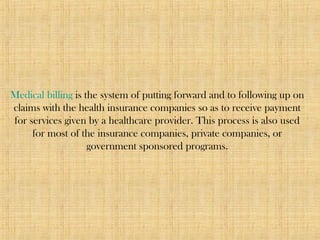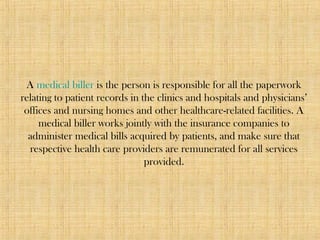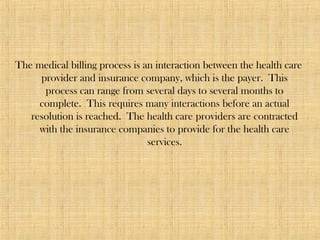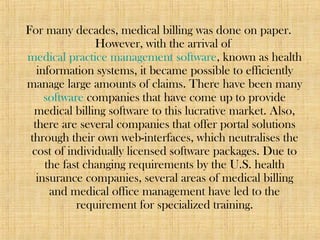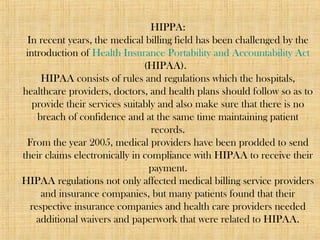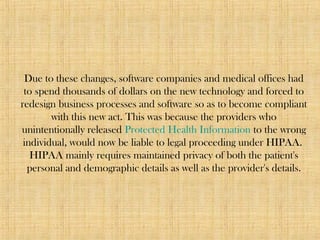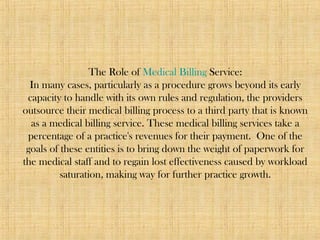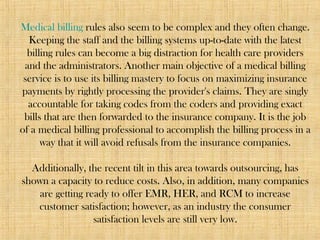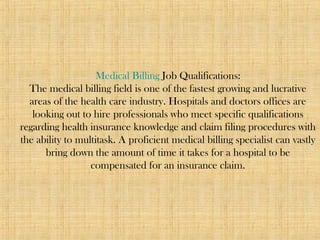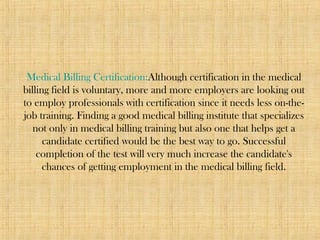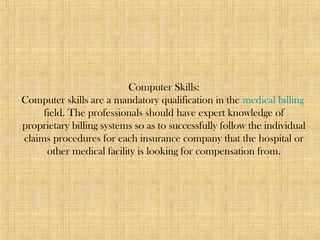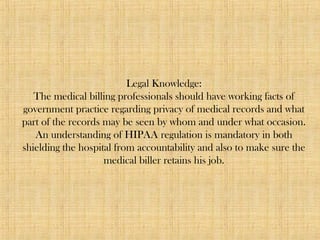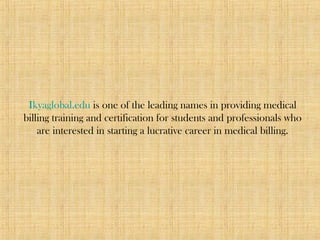Medical billing training
- 1. Medical Billing Training – Trained to Bill!
- 2. Medical billing is the system of putting forward and to following up on claims with the health insurance companies so as to receive payment for services given by a healthcare provider. This process is also used for most of the insurance companies, private companies, or government sponsored programs.
- 3. A medical biller is the person is responsible for all the paperwork relating to patient records in the clinics and hospitals and physicians’ offices and nursing homes and other healthcare-related facilities. A medical biller works jointly with the insurance companies to administer medical bills acquired by patients, and make sure that respective health care providers are remunerated for all services provided.
- 4. The medical billing process is an interaction between the health care provider and insurance company, which is the payer. This process can range from several days to several months to complete. This requires many interactions before an actual resolution is reached. The health care providers are contracted with the insurance companies to provide for the health care services.
- 5. For many decades, medical billing was done on paper. However, with the arrival of medical practice management software, known as health information systems, it became possible to efficiently manage large amounts of claims. There have been many software companies that have come up to provide medical billing software to this lucrative market. Also, there are several companies that offer portal solutions through their own web-interfaces, which neutralises the cost of individually licensed software packages. Due to the fast changing requirements by the U.S. health insurance companies, several areas of medical billing and medical office management have led to the requirement for specialized training.
- 6. HIPPA: In recent years, the medical billing field has been challenged by the introduction of Health Insurance Portability and Accountability Act (HIPAA). HIPAA consists of rules and regulations which the hospitals, healthcare providers, doctors, and health plans should follow so as to provide their services suitably and also make sure that there is no breach of confidence and at the same time maintaining patient records. From the year 2005, medical providers have been prodded to send their claims electronically in compliance with HIPAA to receive their payment. HIPAA regulations not only affected medical billing service providers and insurance companies, but many patients found that their respective insurance companies and health care providers needed additional waivers and paperwork that were related to HIPAA.
- 7. Due to these changes, software companies and medical offices had to spend thousands of dollars on the new technology and forced to redesign business processes and software so as to become compliant with this new act. This was because the providers who unintentionally released Protected Health Information to the wrong individual, would now be liable to legal proceeding under HIPAA. HIPAA mainly requires maintained privacy of both the patient's personal and demographic details as well as the provider's details.
- 8. The Role of Medical Billing Service: In many cases, particularly as a procedure grows beyond its early capacity to handle with its own rules and regulation, the providers outsource their medical billing process to a third party that is known as a medical billing service. These medical billing services take a percentage of a practice's revenues for their payment. One of the goals of these entities is to bring down the weight of paperwork for the medical staff and to regain lost effectiveness caused by workload saturation, making way for further practice growth.
- 9. Medical billing rules also seem to be complex and they often change. Keeping the staff and the billing systems up-to-date with the latest billing rules can become a big distraction for health care providers and the administrators. Another main objective of a medical billing service is to use its billing mastery to focus on maximizing insurance payments by rightly processing the provider's claims. They are singly accountable for taking codes from the coders and providing exact bills that are then forwarded to the insurance company. It is the job of a medical billing professional to accomplish the billing process in a way that it will avoid refusals from the insurance companies. Additionally, the recent tilt in this area towards outsourcing, has shown a capacity to reduce costs. Also, in addition, many companies are getting ready to offer EMR, HER, and RCM to increase customer satisfaction; however, as an industry the consumer satisfaction levels are still very low.
- 10. Medical Billing Job Qualifications: The medical billing field is one of the fastest growing and lucrative areas of the health care industry. Hospitals and doctors offices are looking out to hire professionals who meet specific qualifications regarding health insurance knowledge and claim filing procedures with the ability to multitask. A proficient medical billing specialist can vastly bring down the amount of time it takes for a hospital to be compensated for an insurance claim.
- 11. Medical Billing Certification:Although certification in the medical billing field is voluntary, more and more employers are looking out to employ professionals with certification since it needs less on-the- job training. Finding a good medical billing institute that specializes not only in medical billing training but also one that helps get a candidate certified would be the best way to go. Successful completion of the test will very much increase the candidate's chances of getting employment in the medical billing field.
- 12. Computer Skills: Computer skills are a mandatory qualification in the medical billing field. The professionals should have expert knowledge of proprietary billing systems so as to successfully follow the individual claims procedures for each insurance company that the hospital or other medical facility is looking for compensation from.
- 13. Legal Knowledge: The medical billing professionals should have working facts of government practice regarding privacy of medical records and what part of the records may be seen by whom and under what occasion. An understanding of HIPAA regulation is mandatory in both shielding the hospital from accountability and also to make sure the medical biller retains his job.
- 14. Ikyaglobal.edu is one of the leading names in providing medical billing training and certification for students and professionals who are interested in starting a lucrative career in medical billing.


